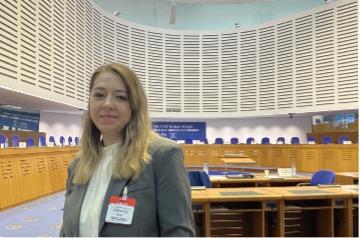European Court of Human Rights and Eastern European States
By Ezgi Siir Kibris

The European Court of Human Rights (ECtHR) is an international court based in Strasbourg, France. In the aftermath of WWII, the ECtHR was established in 1959 to protect Europe from the rise of totalitarian regimes. The Court enforces the European Convention on Human Rights (ECHR), an international treaty designed to protect human rights and basic freedoms in Europe. Any person from the member states can apply to the Court after exhausting domestic remedies. The Court can also hear cases brought by member states against other member states. It has 46 member states, including all European Union countries, Turkey, and the UK. Russia was expelled from the Court on 16 March 2022 over its invasion of Ukraine .

The ECtHR is composed of one judge from each member state of the Council of Europe, currently numbering 46 judges. The judges are selected for a 9-year non-renewable term. Currently, there are 15 female judges on the Court. The share of female judges is higher from Eastern European countries than from other regions, and Eastern European judges are younger than judges from Western European countries.

According to the Annual Report of the Court in 2022, the ECtHR got 45,528 applications in 2022. A simplification of the statistics shows that 52 percent of all applications submitted to the ECtHR came from 22 Eastern European countries that joined the ECtHR after the fall of the Iron Curtain, 28 percent from Turkey, and 20 percent from the twenty four Western European countries .

One of the problems that the ECtHR has to deal with is compliance. Sometimes member states do not comply with the decisions of the Court, although they have promised to comply under the ECHR treaty, which they signed. For instance, on 16 February 2023, the Polish government informed the Court that it would ignore the ECtHR’s measures and would not comply with its order to reinstate judges who had been removed from office under a policy that has been widely criticized for eroding the rule of law in Poland.
In this regard, my dissertation consists of three papers that study the decision-making of judges of the ECtHR. I use qualitative and quantitative methods in my dissertation, including interviews and causal inference techniques. The first paper is about the effect of democratic backsliding on the ECtHR. It focuses on three countries, Hungary, Poland, and Turkey, the countries where democratic institutions have deteriorated most, according to the Varieties of Democracy Project, based in Oslo, Norway (V-Dem) . The findings suggest that as the level of democracy of the defendant country decreases, ECtHR cases become more likely to find human rights violations, and judges from the defendant country become more likely to vote in favor of their governments. The second paper extends the analysis in the first paper to all ECtHR countries. It explores whether there are cross-country alliances between democratic and non-democratic member states of the ECtHR using a dataset that includes all ECtHR judgments. The results contribute to the literature about the impartiality of international courts. The third paper studies the effect of the gender of judges in the ECtHR. It focuses on whether female judges decide differently than male judges and whether the European Union membership plays any role in selecting judges. The results will be significant because the ECtHR member states have recently witnessed trends pointing to a growing backlash against women’s rights and gender equality.

I am grateful to the Skalny Center Polish and Central European Studies at the University of Rochester for supporting me as I worked on my dissertation. With funding from the Skalny Center, I organized fieldwork in Strasbourg, France, and attended a court hearing. I conducted in-depth interviews with 36 sitting and retired judges from 26 countries. I asked judges how their nationality, gender, former occupation, and age affect their decision-making. The funding helped me understand the operations and what is happening inside, learning more about the ECtHR as an institution.
The findings of my interviews revealed that there are differences between judges from Eastern and Western Europe when they approach cases. For example, in child custody cases, Western European countries are more ready to break the biological link and put children into adoption more easily. Moreover, Eastern European judges are more likely to confront problems with their governments at home when they retire. For example, they are less likely to be able to resume their former positions when they return to their home countries. Also, Eastern European judges are more likely to be affected by their home country's politics because they tend to be younger, and ECtHR is not the last post in their careers. More importantly, the variation in the level of democracy in Eastern European countries affects the post-retirement careers of judges. The career options seem brighter in more democratic countries. For example, judges from Estonia, Latvia, and Lithuania are more likely to receive high-level positions when they return to their home countries than judges from Moldova or Georgia.
To conclude, nationality, religious beliefs, former occupation, and career prospects are more pronounced factors among judges that affect their decision-making than gender. Still, female judges tell different stories about how they became international judges, and they related more about their sacrifices, family life, husbands, and children. Gender can cause differences in entry and career. Most interestingly, one of the Eastern European judges said, “you need to be double better than men in this male-dominated job. But you need to be triple better if you are an Eastern European woman in the Court.”
For instance, president of Latvia, Egil Levits, was a judge in the ECtHR from 1995 to 2004.
Ezgi Siir Kibris is a PhD Candidate in the Political Science at the University of Rochester.
